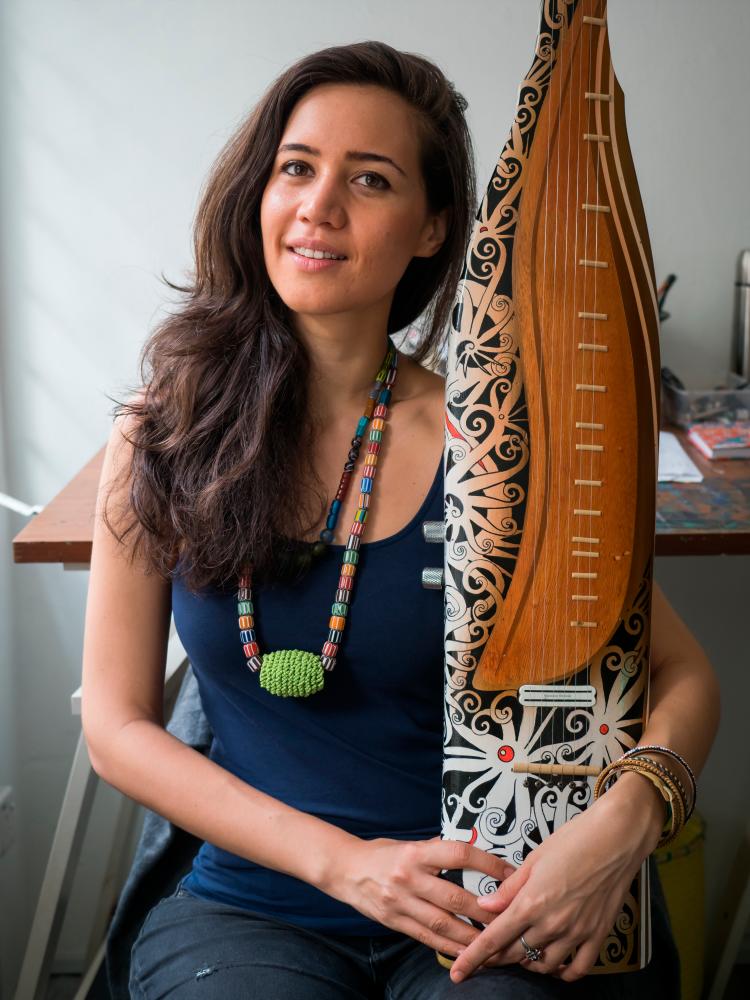NOTHING makes the heart yearn for home more than travel. When Alena Murang took the songs of the Dayak Kelabit and Kenyah to foreign lands around the world, her heart longed for the dense jungle, the rushing rapids, the longhouses, and the people of her ancestral home along the Baram River in Sarawak.
Alena usually performs alongside her bandmates – co-writer Joshua Maran who plays the guitar, Jonathan Wong who is also on guitar, bassist Herman Ramanado, and drummer Jimmy Chong.
While abroad, performing songs in the language of the indigenous people of Sarawak, and strumming on the sape’, a traditional musical instrument, one song, in particular reflected her feelings of being so far away from home.
In the Kenyah language, an endangered Austronesian language spoken by the Kenyah people of Sarawak and Kalimantan, Belian Meno’ is a genre of wistful songs, and Meno’ means the feeling of yearning, thinking of something or someone that is not there.
“In recent years I’ve been travelling a lot, and I would always sing this song on stage, thinking about how much I missed home at the time,” recalled Alena.
She has performed this song at festivals like South by Southwest (USA), Førde Traditional and World Music Festival (Norway), and the OzAsia Festival (Australia).
Those who have heard the song, she explained, find it peaceful and emotional, despite not knowing the meaning to the words.
Like most of the songs that she performs, Alena learned Meno’ from an elder.
“What makes these songs unique is that they are passed from singer to singer, and each performer would make changes to it,” she said.
She learned to play her four-string sape’ from an elder as well. She learnt the craft little by little, over many visits.
“There are more modern iterations of the instruments with more strings and more frets. As is, I play the traditional sape’ which only has notes in the pentatonic scale,” said Alena.
Alena learned to appreciate Kelabit traditions from her parents, especially her father, who is himself Kelabit. Her methods of research however are not as academic as those of her mother, who is an English-Italian anthropologist.
She admits that her way takes time, as do all methods of building lasting relationships. She would also ask the elders for permission before making a song her own.
Recently, Alena released Meno’ as the second single in her upcoming album, along with a music video.
The music video was edited by Sabah-based Kelabit filmmaker Candy Yik, using video clips shot along the roads and rivers of the villages in the interior of Sarawak along the Ulu Baram river.
The album is a part of the Roads To Our Heritage project, a collaboration between Alena, Estranged, and Stonebay, with the support of the Communication and Multimedia Ministry and funded under the Ministry’s 2020 Digital Content Fund for the creative industry.
Roads To Our Heritage is made up of three albums, with a documentary series featuring the three acts as well as Dr Nadia Widyawati Madzhi of UiTM’s Music Faculty as a research partner. The documentary series will explore the stories and heritage of the natives in Sabah and Sarawak over six episodes.
One of the exciting components of the documentary series is that the artistes will be riding on Triumph Motorcycles, a partner of the project, as a part of their journey across East Malaysia. However, the second nationwide movement control order has slowed their progress.
Alena shared that one of the reasons it took her five years to release a second album was funding. The Roads To Our Heritage project and support from the Dayak Cultural Foundation was key to making her efforts of preserving traditional music and delivering it to a contemporary audience a reality.
Alena started her professional musical journey in 2015. Based on advice, she immediately took her music abroad, where she earned accolades such as the recent Best Styling Award at the Buenos Aires Music Video Festival in Argentina for her music video, Midang Midang. Only then did more Malaysians take notice.
Last year, Alena and her cousin Joshua launched Project Ranih, an online platform to preserve Kelabit traditions, especially children’s folk songs. The project was made possible thanks to partial funding from the Foundation of Endangered Languages, a Britain-based non-profit organisation, and donations.
In addition to being a musician, Alena also paints. Between the two arts, she said that painting is more personal to her as it is a solitary form of expression.














